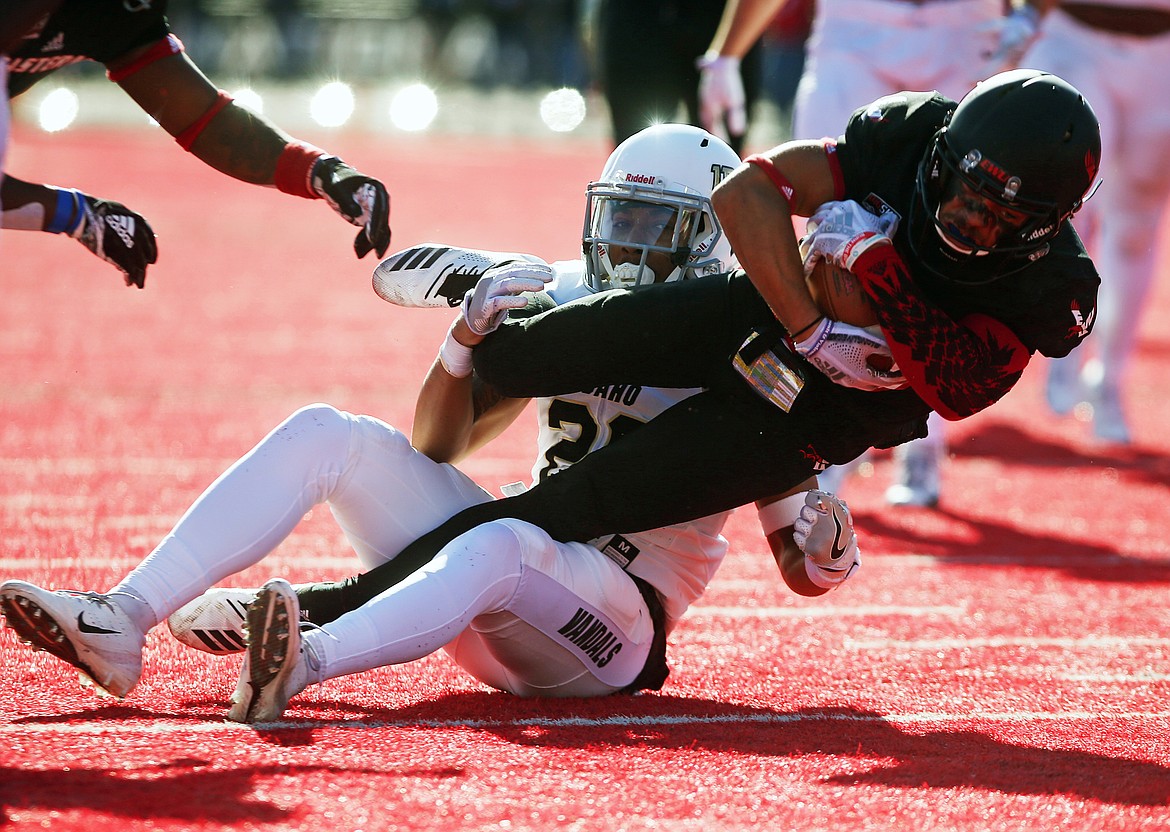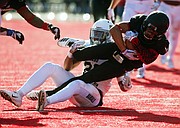Spring is the new fall ... Big Sky pushes all fall sports back to 2021
Any thoughts Idaho may have had of playing some nonconference football games this fall were officially dashed Thursday.
Due to ongoing concerns related to the COVID-19 global pandemic, the Big Sky Conference chose to postpone all competition for its fall sports to spring 2021. The conference’s Presidents’ Council convened Thursday to affirm this recommendation from its members’ athletic directors.
On Aug. 6, the Big Sky voted to postpone its league football season until spring 2021, but left the option open for teams to play nonconference games in the fall.
“I think they were looking forward to still playing some nonconference games this fall, so that was hard news for them,” Idaho coach Paul Petrino said. “But they’ve handled it very well and very mature.”
Idaho was still hoping to play its game at Temple, scheduled for Sept. 12. In fact, the team had a walk-through Wednesday night, working on Temple, Petrino said.
“That made it a little disappointing,” he said.
He said the team will continue with Zoom meetings and walk-throughs for now, until they find out when they can have “spring” ball in the fall, and have actual practices. Idaho’s spring ball was canceled due to COVID-19.
Petrino said three players — whom he declined to identify — chose to opt out this fall due to concerns over the coronavirus.
No dates have been announced for when the rescheduled fall sports seasons will be.
Big Sky schools may continue with permissible athletics activities at their discretion while abiding by NCAA legislation, campus policies, and local and state regulations.
The Big Sky said decisions regarding the conference’s winter sports (men’s and women’s basketball, men’s and women’s indoor track and field) will be made at a later date.
“While I am confident that our conference is making the right decision for the health and safety of our student-athletes, it breaks my heart knowing how disappointing this will be to all of them who were eagerly anticipating the opportunity to compete this fall,” Big Sky commissioner Tom Wistrcill said in a news release. “Our efforts in the conference office now will focus on doing everything within our power to make their spring season the best that it possibly can be, which includes advocating for their NCAA championships to be held then. As campuses begin re-opening this fall, we hope that everyone remains safe and healthy while we continue to learn more about how best to manage this fluid situation and its impact on higher education.”
Idaho has what it calls a “Kibbie Dome bubble,” athletic director Terry Gawlik said, but also bubbles for each team.
“I made a decision in June probably, maybe even May, that we weren’t going to bring basketball back early,” she said. “I just wanted to bring soccer and football back, so that proved to be a pretty wise choice back then. (The other athletes) will come back to school with the other students.”
Gawlik said she didn’t have a figure for financial losses at this time, because of the shifting of fall sports — which included a football game at Washington State on Sept. 19 which would have earned the Vandals a check for $550,000. She did hold out hope that some of the lost money from the fall could be recouped in the spring, once the NCAA announces what scheduling options fall teams might enjoy in the spring.
Idaho’s other scheduled nonconference football game was its season opener with NCAA Division II Western Oregon on Sept. 5. But Western Oregon’s league, the Great Northwest Athletic Conference, opted in July to postpone all of its fall sports seasons.
Other members of the Big Sky Conference are Eastern Washington, Idaho State, Montana, Montana State, Northern Arizona, Northern Colorado, Portland State, Sacramento State, Southern Utah and Weber State.
Eastern Washington had previously announced on Monday that it was postponing indefinitely fall practices and competition in volleyball, soccer, cross country, tennis and golf.
“Much like the decisions we’ve made for our overall student body, the health and wellness of our student-athletes is our primary concern,” EWU interim president David May said. “It’s imperative that we continue to limit in-person interactions and travel to mitigate the possible transmission of infection. We want to ensure the best environment possible for our student-athletes, coaches, staff and fans when practices and competition do resume.”



